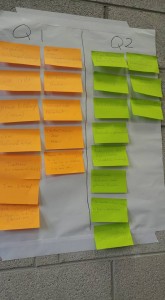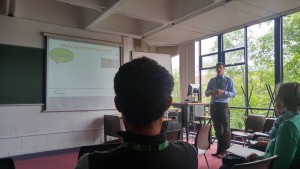Brad and I spent the day at the EUFRAS Conference in various workshops. I participated first in “Connecting with hard to reach farms.” The speaker Jim Kinsella from University College Dublin presented some recent research from TEAGASC. They have found that typically 1/3 of farms in their country are very active with advisory service, 1/3 of farms are moderate with primarily coming to open days and asking for a few things, and 1/3 who do not use the service. The biggest groups found not to be using their services include elderly farmers, young farmers with off farm jobs, and women. We shared experiences from our own countries then broke into groups to answer basic questions of how we in our own countries deal with similar issues. One questions was should we try to reach the 1/3 that does not use services? Some believed we shouldn’t and some pointed out that for the common good we had to for the health and strength of the industry. Many countries charge for their services and proposed that free service would help their situations. It was interesting to them for me to explain that Virginia Cooperative Extension is free to the farms and that taking an educated guess that the 1/3 estimate would be similar to us.
Brad and I both participated in the “Farm Succession Planning” workshop. Thomas Curran from TEAGASC presented programs that he administrates for farm transition. The average Irish farmer is 57 years old (sound familiar). In Ireland, farmers can enter into formal farm partnerships with a successor and receive many benefits. The farm and operation is still owned by the orginial farmer, but there is a plan in place that in minimum of 5 years for the successor to slowly take on more responsibility and eventually make it completely legal. They have 1,500 registered this year for the program. The farms who participate can receive tax brakes and increase farm payments. TEAGASC organizes clinics to encourage succession planning and has a guidebook. We were broke up into groups to answer questions about how we are handling back in our countries and what common issues that we found. It was amazing when an advisor from Italy described almost exactly what we have seen in Virginia. He stated that in Italy the value-added farms with high in crops like vineyards, dairies, and produce often had no issue with succession as many family members could live off the farm income. Those farms who are profitable, but not profitable enough for additional family to live off the income are the major area of concern. The younger generation would have to wait till the parents could afford to retire leaving younger generation to find other opportunities. The last group are farms that are not profitable and the younger generation was leaving to find other opportunities. Additional, common issues found was that lack of certainty for older farmers (no retirement planning), limited understanding of tax issues, and that education often meant the younger generation didn’t return to the farm. Brad was able to share the use of conservation easements in Virginia, which seemed to be a new concept to our group.
We spent our afternoon in the EUFRAS Group Meeting with representatives from each country there to discuss issues and decide groups of work. One major issue in the European Union is the lack of advisory services to farmers, especially non private advisory services. TEAGASC is one of the few in the EU especially with a research component. The EU has put a lot of money into agriculture research, but without advisory services it is not reaching the farmers. Therefore, the EU helped push for the development of EUFRAS 5 years ago and TEAGASC has acted has the leader of the project. EUFRAS is working toward creating more advisory services and group research projects throughout Europe. Instead of each country conducting their own research, countries are now researching together. TEAGASC has conducted several exchange programs for advisors including sending advisors to Bavaria, Finland, and now Virginia. Brad, Tommy, David, and I were asked to discuss our experiences.


